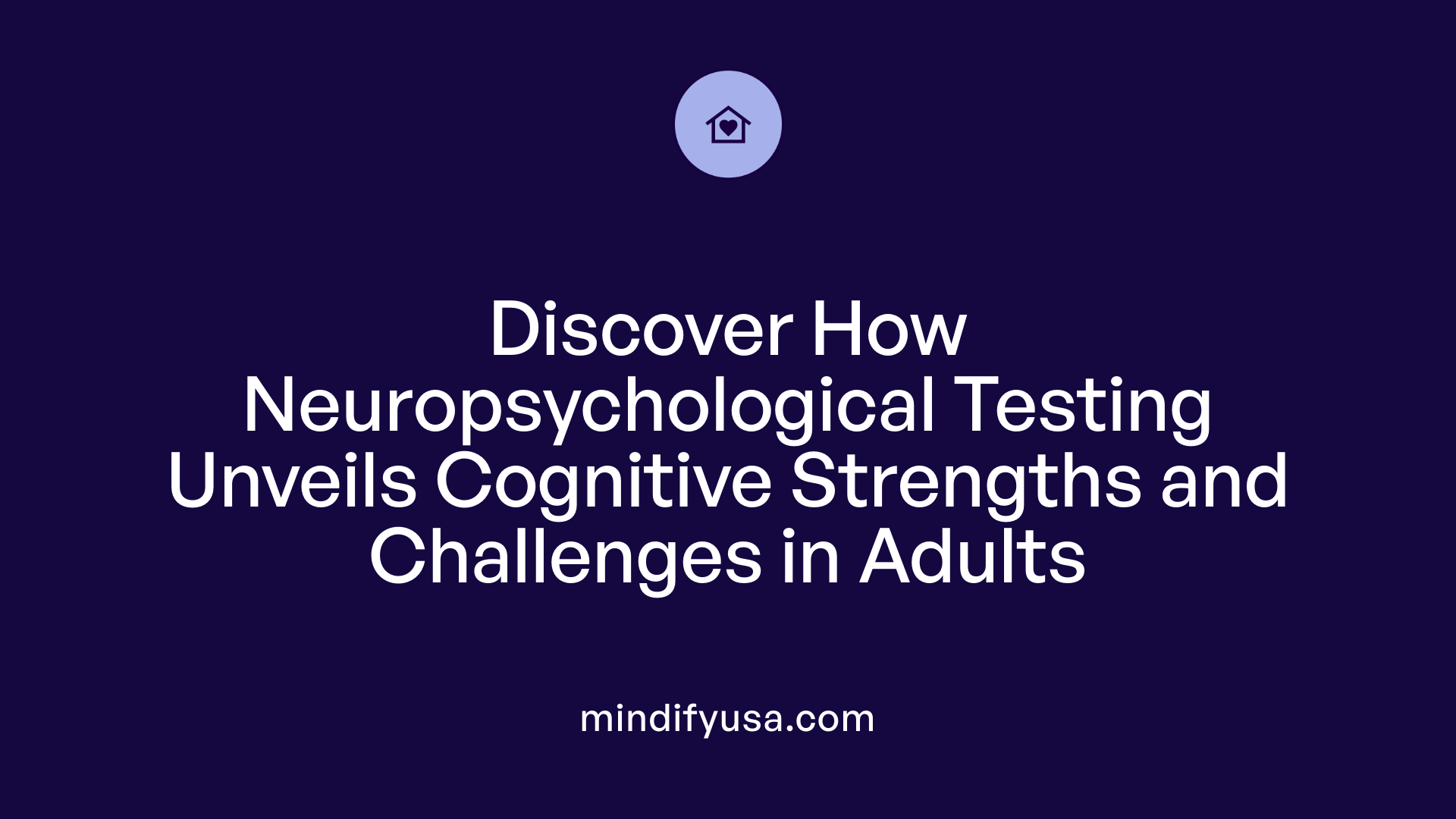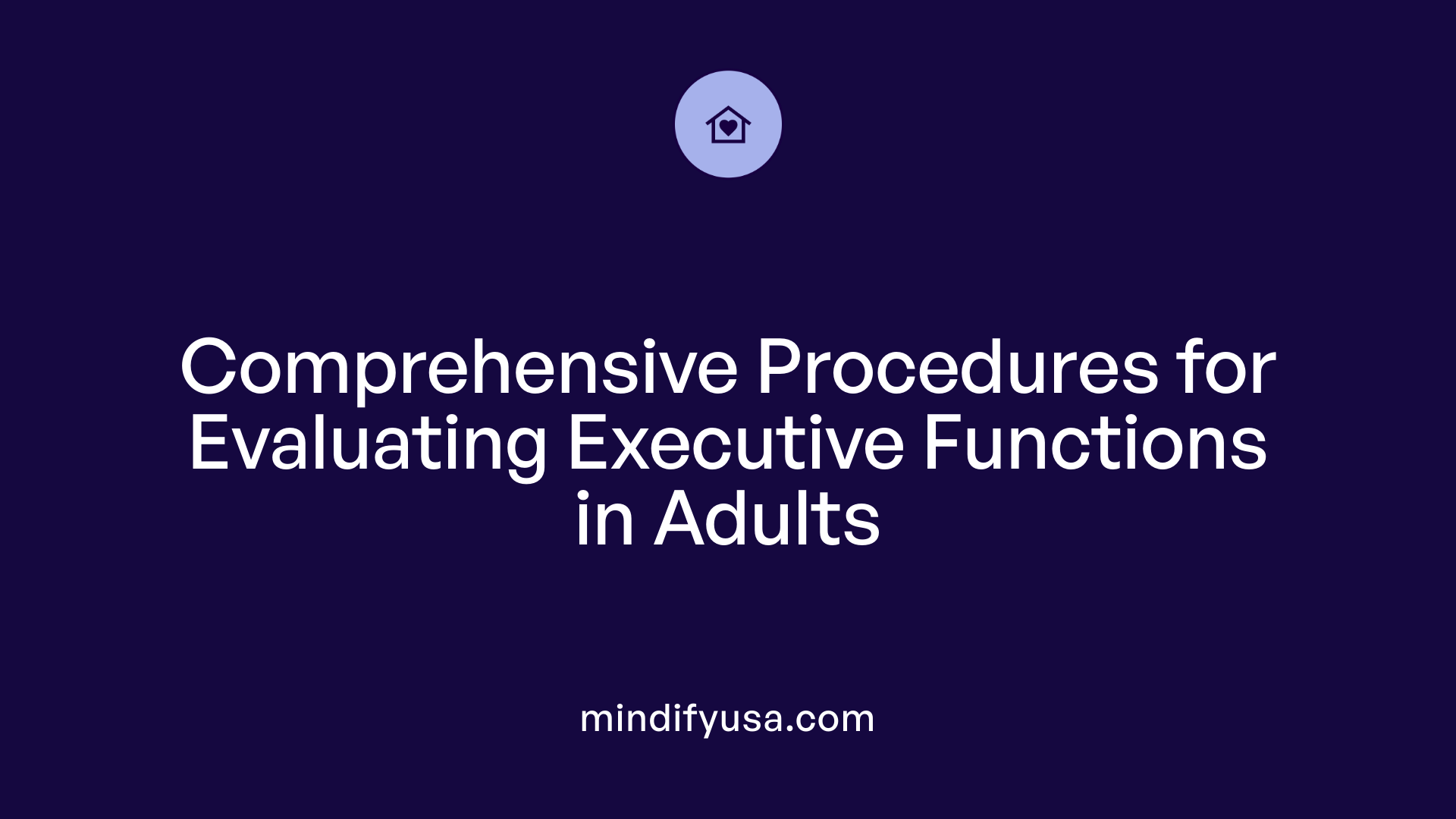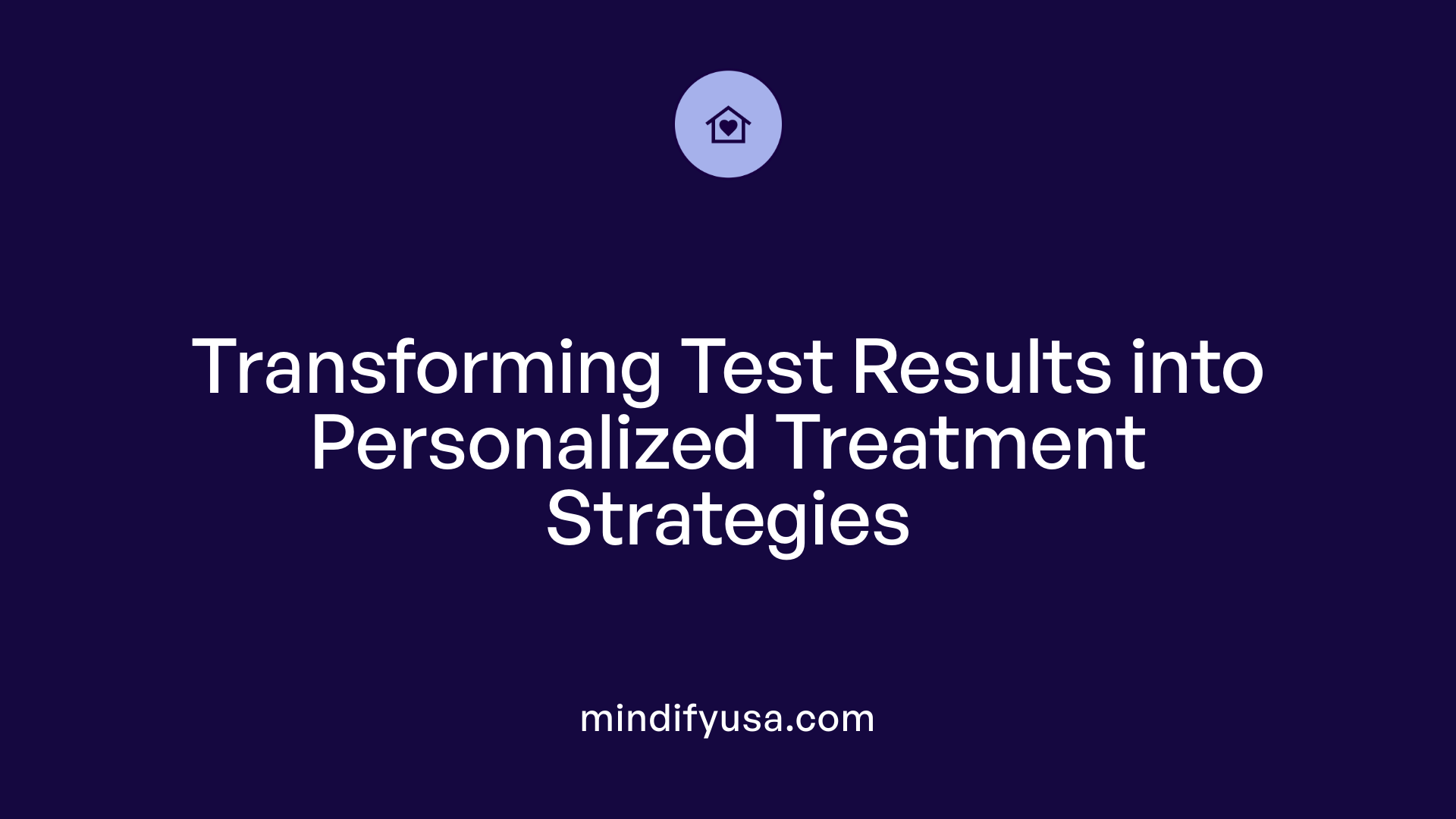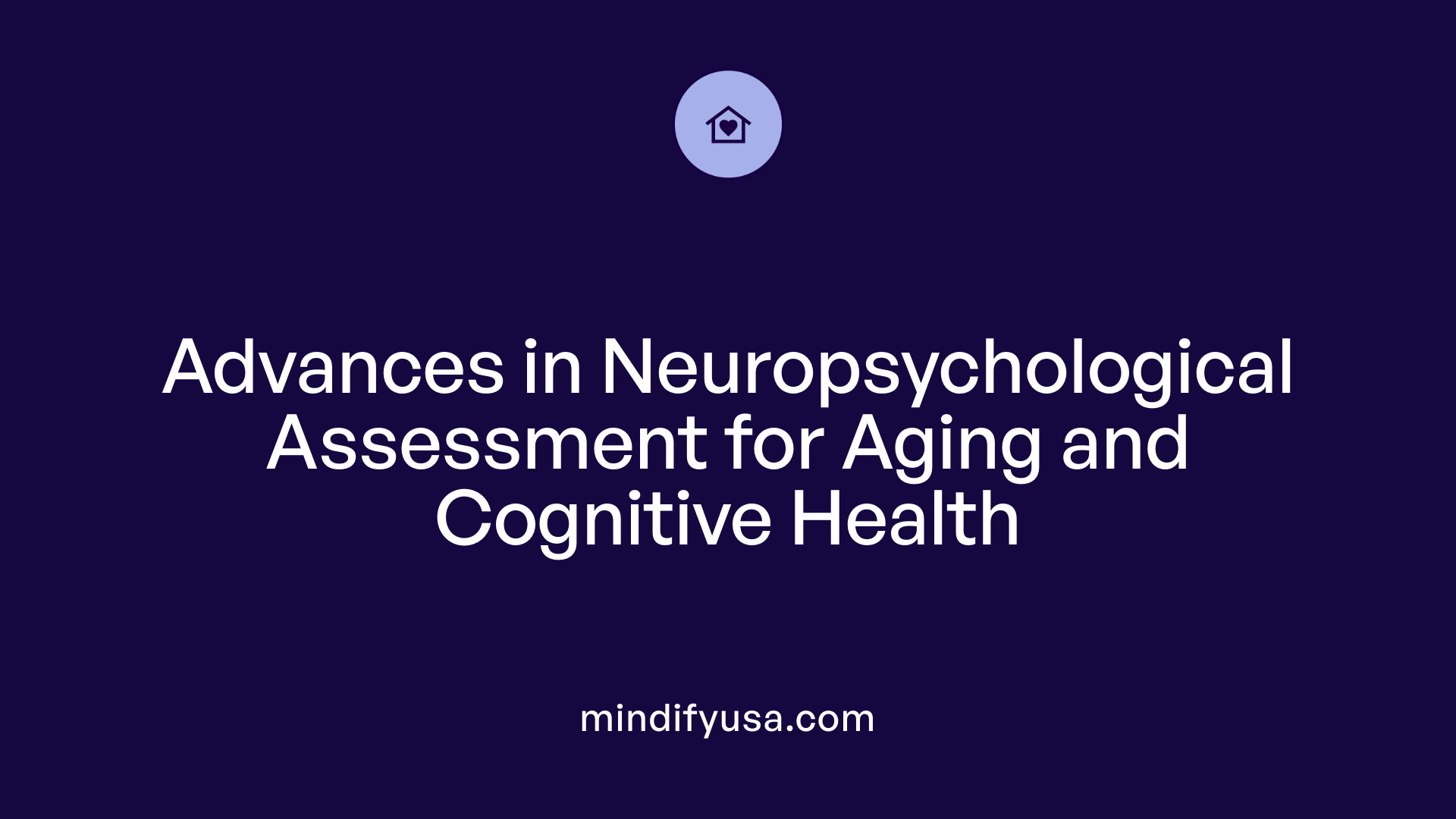Understanding the Role of Neuropsychological Assessments in Adult Cognitive Health
Neuropsychological testing plays a crucial role in evaluating executive function deficits in adults. These complex assessments are designed to identify specific cognitive impairments, facilitate accurate diagnoses, and tailor interventions that can significantly improve daily functioning and quality of life. By examining multiple brain-related skills through standardized tests and observational tools, clinicians can better understand how brain health impacts behavior, decision-making, and independence in adult populations.
Purpose and Benefits of Neuropsychological Testing for Adults
 Neuropsychological testing plays a crucial role in the assessment of adults experiencing concerns related to executive functions, which are mental processes that help manage self-resources to achieve goals. These functions include working memory, cognitive flexibility, and inhibitory control. When deficits are suspected, such as difficulties in planning, decision-making, or impulse control, comprehensive testing provides essential insights.
Neuropsychological testing plays a crucial role in the assessment of adults experiencing concerns related to executive functions, which are mental processes that help manage self-resources to achieve goals. These functions include working memory, cognitive flexibility, and inhibitory control. When deficits are suspected, such as difficulties in planning, decision-making, or impulse control, comprehensive testing provides essential insights.
The primary purpose of these assessments is to accurately diagnose any cognitive impairments. By evaluating various domains like attention, reasoning, and memory, clinicians can determine the severity and specific nature of the deficits. This detailed profiling helps differentiate conditions such as dementia, traumatic brain injury, or psychiatric disorders from other potential causes.
Neuropsychological tests also yield objective data that aid in understanding how cognitive issues affect everyday activities. For example, they can reveal how executive dysfunction might impact driving, medication management, or employment. This information is vital for establishing safe and effective intervention plans.
Monitoring changes over time is another significant benefit. Repeating assessments can track disease progression or improvements resulting from treatment, offering a clearer picture of prognosis. Such insights support personalized treatment strategies, whether through cognitive training, occupational therapy, or other rehabilitative approaches.
In addition, these evaluations assist in decision-making processes related to independence and work capacity. They provide evidence for legal or forensic purposes and can be used to determine fitness for activities that demand high levels of cognitive functioning.
Overall, neuropsychological testing equips clinicians with comprehensive data to diagnose, characterize, and manage executive function deficits effectively. It ultimately aims to enhance the quality of life by guiding tailored interventions and fostering better outcomes.
Testing Procedures and Assessment Domains in Adult Executive Function Evaluation

What are the procedures and assessment domains involved in testing executive function in adults?
Evaluating executive functions in adults involves a comprehensive approach utilizing both performance-based tasks and rating scales. These methods aim to assess multiple interconnected cognitive processes essential for managing daily activities.
Performance-based tasks are standardized tests that directly measure specific executive skills. Common assessments include the Trail Making Test (TMT) Form B, Stroop Color and Word Test, Wisconsin Card Sorting Test (WCST), and the Delis-Kaplan Executive Function System (D-KEFS). These tests evaluate abilities such as mental flexibility, response inhibition, task switching, and problem-solving. For instance, the TMT assesses cognitive flexibility and processing speed, while the Stroop test evaluates inhibitory control.
In addition to performance tasks, questionnaires like the Behavior Rating Inventory of Executive Function-2 (BRIEF-2), Brown Executive Function/Attention Scales (EF/A), and the California Executive Function Inventory (CEFI) gather insights from informants about how individuals perform real-world executive tasks. These behavioral assessments provide valuable context about everyday functioning and help identify challenges that may not emerge in structured test environments.
Given the complexity of executive functions, evaluations typically cover three to four domains, including planning, working memory, problem-solving, verbal fluency, and inhibitory control. Due to their interconnected nature, assessing multiple areas provides a fuller understanding of an individual's capabilities and difficulties.
This multi-domain approach allows clinicians to pinpoint specific deficits and strengths, informing tailored interventions. Combining performance-based measures with behavioral ratings ensures a thorough, multidimensional profile of executive functioning, ultimately helping guide treatment plans, monitor progress, and address daily life challenges effectively.
Neuropsychological Tests Used in Assessing Executive Function Deficits
A variety of standardized neuropsychological assessments are employed to analyze executive function deficits in adults, helping clinicians pinpoint specific cognitive challenges. The Wisconsin Card Sorting Test (WCST) is widely used to evaluate cognitive flexibility and problem-solving skills. It tasks individuals with sorting cards based on changing rules, thus revealing their ability to adapt and shift strategies.
The Stroop Test measures inhibitory control and processing speed. Participants name the color of the ink instead of the word, which may spell a different color, testing their capacity to suppress automatic responses.
The Trail Making Test, especially Form B, assesses mental flexibility, visual attention, and task-switching ability. It requires connecting numbered and lettered dots in a specific sequence, evaluating planning and cognitive speed.
Verbal Fluency Tests (VFTs), including letter and category fluency, examine verbal initiation, fluency, and retrieval strategies. They see how effectively individuals can generate words according to specific constraints.
Additional assessments such as the Tower of London evaluate planning and problem-solving, while the Clock Drawing Test provides insights into organization and visuospatial skills related to executive functioning.
Below is a table summarizing these tests, the cognitive domains they assess, and additional details:
| Test Name | Main Domain Assessed | Additional Notes |
|---|---|---|
| Wisconsin Card Sorting Test (WCST) | Flexibility, problem-solving | Provides insight into shifting mental sets |
| Stroop Color and Word Test | Inhibitory control, processing speed | Measures interference control |
| Trail Making Test (Form B) | Mental flexibility, task switching | Assesses cognitive speed and flexibility |
| Verbal Fluency Tests (VFTs) | Verbal fluency, initiation | Includes letter and category fluency |
| Tower of London | Planning, problem-solving | Evaluates strategic planning |
| Clock Drawing Test | Visuospatial skills, organization | Useful for detecting visuospatial deficits |
These evaluations are critical in diagnosing cognitive impairments, differentiating among various neurocognitive conditions, and guiding tailored interventions. Understanding performance across multiple domains offers a comprehensive picture of executive function health in older adults and can aid in early detection of decline.
Interpreting and Applying Test Results in Clinical Practice
How are neuropsychological test results for executive function interpreted and applied in clinical practice?
Neuropsychological assessment outcomes for executive functions are primarily understood through analyzing performance scores and identifying specific patterns. These patterns can reveal particular cognitive deficits, such as difficulty with inhibitory control, working memory, cognitive flexibility, or planning. For instance, poor performance on the Stroop Test may highlight issues with inhibitory control, whereas challenges on the Trail Making Test B could indicate reduced mental flexibility.
Clinicians often combine results from performance-based tests with observational data. Rating scales and questionnaires—like the Adult Executive Functioning Inventory (ADEXI) or self-assessment tools such as the ESQ-R—offer insights into how cognitive deficits manifest in everyday behaviors. It's important to recognize that these tools may measure different aspects of executive functioning, with tests focusing on underlying neurocognition and ratings capturing behavioral and emotional expressions.
Integrating these data points with clinical observations, developmental history, and functional context enables a comprehensive understanding of each individual’s unique profile. This holistic approach helps professionals to identify the specific areas affected and to formulate accurate diagnoses, whether for mild cognitive impairment, dementia, or other neurological conditions.
Based on the assessment findings, clinicians can design personalized interventions, which might include cognitive rehabilitation programs, strategies for compensating for deficits, or environmental modifications to support independence. Tracking changes over time through follow-up assessments helps in evaluating the effectiveness of treatments and adjusting strategies accordingly.
It's essential to approach these interpretations with caution. Because behavioral ratings and neuroperformance tests may only moderately correlate, relying solely on one method can be misleading. Instead, a multi-method, multidisciplinary approach ensures a more reliable and detailed understanding.
Ultimately, the goal of interpreting neuropsychological test results is to develop actionable plans aimed at improving functional outcomes. Whether it's supporting decision-making capacity, enhancing daily life skills, or reducing safety risks, these insights guide targeted support and measure progress in managing executive function challenges.
Role of Neuropsychological Assessments in Diagnosing and Managing Cognitive Issues
How do neuropsychological assessments aid in diagnosing and managing adult cognitive issues related to executive functions?
Neuropsychological assessments play a crucial role in understanding and managing cognitive problems in adults, especially related to executive functions. These evaluations provide detailed insights into various mental processes, including attention, working memory, reasoning, problem-solving, and inhibitory control.
Standardized tests are used to measure different cognitive domains, allowing clinicians to identify specific deficits and strengths. This helps distinguish between normal aging and underlying neurological or psychiatric conditions, such as mild cognitive impairment or dementia.
Early detection is particularly important. Neuropsychological testing can identify subtle changes indicating the onset of cognitive decline, enabling timely interventions that can slow progression or improve quality of life.
Throughout the course of treatment or recovery, these assessments are repeated to monitor changes, measure the effectiveness of interventions, and make necessary adjustments.
Furthermore, evaluations can inform decisions about a person’s capacity to make judgments, important for safety, independence, and legal considerations.
By offering a comprehensive picture of an individual’s cognitive profile, neuropsychological assessments help tailor personalized treatment plans, including cognitive training, behavioral strategies, and rehabilitation programs. They also assist in setting realistic goals for recovery and daily functioning.
Overall, these assessments are vital tools that support accurate diagnosis, effective management, and ongoing monitoring of cognitive health in adults experiencing executive dysfunction. They provide the foundation for interventions that can significantly enhance daily life and overall well-being.
Application of Test Results and Their Impact on Treatment Planning
 Neuropsychological test results for executive function are primarily interpreted by examining performance scores and patterns to identify specific cognitive impairments. These include challenges with inhibition, working memory, cognitive flexibility, and planning. Clinicians analyze both performance-based assessments, such as the Stroop Test and Executive Function Performance Test (EFPT), and behavioral rating scales. These tools measure different aspects—neurocognitive abilities versus behavioral symptoms—and their combined insights provide a fuller picture.
Neuropsychological test results for executive function are primarily interpreted by examining performance scores and patterns to identify specific cognitive impairments. These include challenges with inhibition, working memory, cognitive flexibility, and planning. Clinicians analyze both performance-based assessments, such as the Stroop Test and Executive Function Performance Test (EFPT), and behavioral rating scales. These tools measure different aspects—neurocognitive abilities versus behavioral symptoms—and their combined insights provide a fuller picture.
Performance tests tend to have a stronger connection to real-world functioning like academic success and daily problem-solving skills. By integrating the results with clinical observations and considering the individual’s developmental history and environment, practitioners develop tailored intervention strategies.
Interpreting these results helps in formulating plans focused on improving specific deficits. For example, if a person shows difficulties with cognitive flexibility, interventions like cognitive flexibility training or environmental modifications can be introduced.
The findings also guide decision-making in daily life, such as managing medications, maintaining social interactions, or making career decisions. Regular monitoring of test outcomes aids in tracking progress, adjusting therapies, and evaluating the effectiveness of interventions.
Support strategies aimed at increasing independence may include cognitive training programs, assistive technologies, and behavioral strategies. These are designed to compensate for deficits and promote functional autonomy.
In clinical practice, the integration of test results enhances personalized treatment planning, ensuring interventions address the unique cognitive profile and daily challenges of each individual, ultimately improving quality of life.
The Significance of Multi-Domain and Ecological Approaches
Assessment of Real-World Executive Functioning
Evaluating executive functions in everyday contexts is essential to understanding how older adults manage daily tasks. Traditional tests, such as the Trail Making Test or Stroop, provide valuable insights into specific mental skills like flexibility and inhibitory control. However, these assessments often occur in clinical settings and may not fully reflect real-life challenges.
Dynamic Testing and Ecological Validity
Dynamic and ecological assessments focus on how executive functions operate outside laboratory conditions. These approaches involve observing individuals during real or simulated everyday activities, considering factors like fatigue and stress. Such assessments help identify difficulties in practical scenarios, such as managing medications or handling financial responsibilities, offering a more complete picture of functional abilities.
Importance of Collaboration with Other Professionals
Effective evaluation and intervention often require teamwork among neuropsychologists, occupational therapists, speech-language pathologists, and other specialists. This collaboration ensures that test results translate into tailored strategies that improve daily functioning. Using multiple perspectives and tools—standardized tests, ecologically valid assessments, and self-report questionnaires—enhances diagnostic accuracy and guides effective support plans.
| Approach | Focus Area | Tools/Methods | Benefits |
|---|---|---|---|
| Standard Neuropsychological Tests | Specific cognitive domains (memory, flexibility) | Trail Making, Stroop, WCST | Precise measurement of mental skills in structured settings |
| Ecological and Dynamic Assessments | Real-life functional capabilities | Real-world task simulations, observations | Increased relevance to everyday challenges |
| Multidisciplinary Collaboration | Holistic understanding of abilities | Team assessments, combined clinical input | Comprehensive, personalized support strategies |
Adopting these integrated approaches helps clinicians better understand the impacts of aging on day-to-day life, leading to more targeted and effective interventions for older adults.
Cognitive Training and Intervention Strategies for Adults with EF Deficits
Can executive functioning be improved at any age?
Yes, research shows that executive functions (EF) are adaptable and improvements are possible regardless of age. Even older adults can enhance their skills through targeted interventions.
What training approaches support EF development?
Several methods have proven effective in strengthening EF. Cognitive training programs focus on exercises designed to bolster skills like working memory, mental flexibility, and impulse control. Physical activity, especially aerobic exercise, has been linked to better cognitive performance and can boost executive functions.
Additionally, skill development strategies such as planning, organization, and self-regulation training help individuals manage daily tasks more efficiently.
How do speech-language pathologists contribute?
Speech-language pathologists (SLPs) play a vital role in identifying and treating EF deficits. They conduct assessments to pinpoint specific challenges and design personalized therapy plans. These professionals also teach strategies to improve organizational skills, memory, and self-control. Their involvement ensures interventions are tailored and effective.
What strategies can help in developing organizational, planning, and self-regulation skills?
Practical strategies include using planners and checklists to organize tasks and manage time better. Breaking down complex activities into smaller steps facilitates planning and reduces overwhelm. Mindfulness exercises and relaxation techniques can improve self-regulation, helping manage stress and emotional responses.
By combining these approaches, adults with EF challenges can enhance their cognitive resilience and improve their quality of life. Regular practice and interprofessional support are essential for sustained progress.
| Approach | Focus Area | Additional Comments |
|---|---|---|
| Cognitive training | Working memory, flexibility | Computer-based programs or apps can help develop skills. |
| Physical activity | Brain health, overall cognition | Aerobic exercises like walking or swimming are beneficial. |
| Skill development | Organization, planning, regulation | Use of planners, routines, and mindfulness practices. |
| Professional support | Tailored interventions | Speech-language therapists and neuropsychologists provide specialized guidance. |
Understanding and applying these methods can significantly support adults in overcoming EF deficits, leading to better functioning and independence.
Supporting Adult Individuals with EF Deficits and Enhancing Functioning
 Providing support for adults facing executive function (EF) challenges involves tailored strategies that focus on enhancing daily functioning and independence. Personalized approaches such as cognitive training, organizational tools, and routine planning can significantly improve managing tasks like medication adherence, bill payment, and social interactions.
Providing support for adults facing executive function (EF) challenges involves tailored strategies that focus on enhancing daily functioning and independence. Personalized approaches such as cognitive training, organizational tools, and routine planning can significantly improve managing tasks like medication adherence, bill payment, and social interactions.
Occupational therapists often develop customized interventions to strengthen skills like planning, prioritizing, and task initiation. Speech-language pathologists also contribute by designing exercises to improve cognitive flexibility and self-regulation.
Assessing decision-making capacity is crucial, especially for individuals with cognitive impairment. Thorough evaluations help determine the ability to make informed choices about personal and financial matters, ensuring safety and autonomy.
Support for independent living includes developing routines, utilizing electronic reminders, and establishing environmental modifications to reduce distractions. Interprofessional collaboration among neuropsychologists, therapists, and caregivers ensures comprehensive support tailored to each individual’s needs.
Incorporating ecological assessments that simulate real-life situations enhances the effectiveness of strategies by addressing everyday challenges. These combined efforts foster greater independence and quality of life for adults with EF difficulties.
Future Directions and Conclusion
 Advancements in neuropsychological assessment techniques continue to enhance our understanding of executive functions in older adults. Recent developments aim to incorporate more ecologically valid and dynamic testing methods that better reflect real-world challenges, such as computerized adaptive tests and virtual reality simulations. These innovations facilitate a more comprehensive evaluation of how executive deficits manifest in daily life, offering clinicians richer data to guide intervention.
Advancements in neuropsychological assessment techniques continue to enhance our understanding of executive functions in older adults. Recent developments aim to incorporate more ecologically valid and dynamic testing methods that better reflect real-world challenges, such as computerized adaptive tests and virtual reality simulations. These innovations facilitate a more comprehensive evaluation of how executive deficits manifest in daily life, offering clinicians richer data to guide intervention.
Early detection and intervention are crucial in managing cognitive decline associated with aging, mild cognitive impairment, or early stages of dementia. Implementing routine screening using validated tests like the Trail Making Test or verbal fluency assessments can identify subtle deficits before they significantly impact daily activities. Prompt interventions—whether cognitive training, lifestyle modifications, or occupational therapy—can slow decline and improve quality of life.
A multidisciplinary approach remains essential in accurately assessing and treating executive dysfunction. Collaboration among neuropsychologists, speech-language pathologists, occupational therapists, and medical professionals ensures a holistic view of the individual's cognitive and functional status. Such teamwork supports tailored intervention strategies that address specific deficits in planning, flexibility, or inhibitory control, fostering better outcomes.
In clinical practice, neuropsychological test results are primarily interpreted by looking at performance scores and patterns. Elevated or impaired scores in tasks like the Stroop Test or Wisconsin Card Sorting Test highlight particular areas of difficulty. These insights are integrated with clinical observations and functional assessments to diagnose conditions accurately and develop targeted interventions. While performance-based tests tend to better predict everyday functioning, combining them with behavioral ratings provides a more complete picture.
Ultimately, continued research and technological innovations promise to make assessments more accessible, accurate, and reflective of real-life challenges. Early detection paired with multidisciplinary management can significantly enhance support for aging individuals experiencing or at risk of executive function decline, fostering independence and well-being in later years.
Concluding Remarks on the Value of Neuropsychological Testing for Adult EF
Neuropsychological testing provides a detailed, multidimensional understanding of executive function deficits in adults, guiding diagnosis, treatment, and support strategies. As assessment techniques advance and integrate ecological validity, they will continue to play a vital role in personalized care, early detection, and ongoing management of cognitive health in adult populations.
References
- The most frequently used tests for assessing executive ...
- Neuropsychological Testing: What It Is, Purpose & Procedure
- Neuropsychological Evaluations in Adults
- Executive Functioning | What It Is & How To Test For It
- Executive Function Deficits
- How to Assess Your Executive Function Skills as an Adult ...
- Neuropsychological Testing





































































































